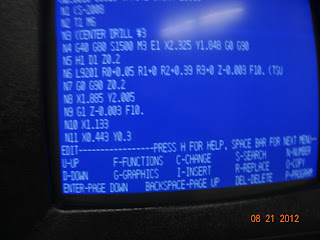Until a couple of semesters ago, I taught two classes. One was
a three-hour lecture (Materials and Manufacturing Processes: MEEN 3100), and
the other was a three-hour lab (CAM/Machining and Quality Control: MEEN 3521) in the Mechanical and Manufacturing
Engineering Department. However, I chose
to cut this workload down to the lab only since my vocal cords have been significantly
effected (for the past few years) by allergy, particularly during the spring. While there is more prep time involved working
on the design of lab projects (CAD/CNC Programming, etc.) there is less time spent
lecturing/talking for long stretches at each class meeting. And, quite frankly, students seemed to be
much more attuned to being in the lab, involved with hands-on activities rather
than listening to blah, blah, blah about the physical properties and processes of
materials (Metals, Ceramics, Polymers, Composite Materials, etc.)!
In particular it is hard to fathom in a classroom
environment the underlying principles of group technology and the flexible
manufacturing systems prevalent in today’s ever so competitive global manufacturing. Thus there is no substitute for whatever
degree we can engage our students in hands-on manufacturing/machining process
planning, part-programming, actual CNC
operating system settings (Fadal Machining Center, HAAS Turning and Machining MCU, CMC, etc.),
and allow them to above all actually ‘make some chips’, i.e. do actual
machining/engraving and alike. I for
one, most certainly, provide them with opportunities to apply the theoretical
principles that have been drilled in the classrooms with hands-on application in
the labs.
In case that you may not be familiar with TSU, here are some
selective excerpts from the TSU website as well as a link for your perusal to
our ME program. http://www.tnstate.edu/engineering/
LOCATION
Nashville, Tennessee: state capital and second-largest
city in the state, population 600,000; known as “Music City USA” and “The
Athens of the South”; center of government, banking, insurance, publishing,
healthcare, transportation, art, culture, and education; beautiful main campus
sits on 500 acres near the Cumberland River in a residential neighborhood just
10 minutes northwest of downtown
ACADEMIC PROGRAMS
77 majors in eight undergraduate and graduate colleges
and schools; arts and sciences; business; education; engineering, technology,
and computer science; health sciences; public service and urban affairs;
agriculture and consumer sciences; nursing
DEGREES
Undergraduate: Bachelor of Arts; Bachelor of Science;
Bachelor of Business Administration; Bachelor of Interdisciplinary Studies;
Bachelor of Professional Studies; Bachelor of Science in Nursing; Associate in
Applied Science; Teacher Certification
Graduate: Master of Arts; Master of Science; Master of
Business Administration; Master of Criminal Justice; Master of Education;
Master of Engineering; Master of Public Administration; Master of Science in
Nursing; Certificate in Health Administration and Planning; Certificate in
Nonprofit Management; Specialist in Education
Fall 2011 semester enrollment: 7,105 undergraduate and 2,060 graduate
students
450 full-time academic faculty; 72.7% of faculty have
terminal degrees; undergraduate student-faculty ratio: 16 to 1
Tennessee State University is accredited by the
Commission on Colleges of the Southern Association of Colleges and Schools;
-----------
Here are some selective shots from our Mech. and Mfg. Engineering (3 out of 5) labs:
Hass MCU: Machining & Turning Centers
Program Library
Engraving program...
Conventional Machining Lab
(One of two labs)
Newly installed Plastic Injection Molding Press (to be fully operational Jan./2013)
Senior class/lab activity...
Faculty Directory (partial list)...
*
*



















No comments:
Post a Comment